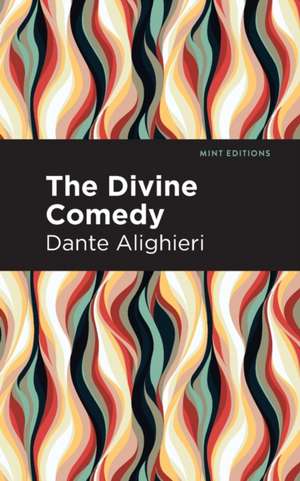The Divine Comedy (complete): Mint Editions
Autor Dante Alighierien Limba Engleză Paperback – 31 ian 2021
| Toate formatele și edițiile | Preț | Express |
|---|---|---|
| Paperback (1) | 135.64 lei 3-5 săpt. | |
| Mint Editions – 31 ian 2021 | 135.64 lei 3-5 săpt. | |
| Hardback (1) | 201.68 lei 3-5 săpt. | |
| Mint Editions – 15 feb 2021 | 201.68 lei 3-5 săpt. |
Din seria Mint Editions
-
 Preț: 32.32 lei
Preț: 32.32 lei -
 Preț: 111.03 lei
Preț: 111.03 lei -
 Preț: 81.23 lei
Preț: 81.23 lei -
 Preț: 92.53 lei
Preț: 92.53 lei -
 Preț: 56.26 lei
Preț: 56.26 lei -
 Preț: 43.90 lei
Preț: 43.90 lei -
 Preț: 153.79 lei
Preț: 153.79 lei -
 Preț: 62.64 lei
Preț: 62.64 lei -
 Preț: 27.00 lei
Preț: 27.00 lei -
 Preț: 299.10 lei
Preț: 299.10 lei -
 Preț: 177.54 lei
Preț: 177.54 lei -
 Preț: 74.19 lei
Preț: 74.19 lei -
 Preț: 146.59 lei
Preț: 146.59 lei -
 Preț: 62.45 lei
Preț: 62.45 lei -
 Preț: 210.27 lei
Preț: 210.27 lei -
 Preț: 117.10 lei
Preț: 117.10 lei -
 Preț: 85.73 lei
Preț: 85.73 lei -
 Preț: 50.05 lei
Preț: 50.05 lei -
 Preț: 161.22 lei
Preț: 161.22 lei -
 Preț: 68.66 lei
Preț: 68.66 lei -
 Preț: 99.14 lei
Preț: 99.14 lei -
 Preț: 68.21 lei
Preț: 68.21 lei -
 Preț: 54.63 lei
Preț: 54.63 lei -
 Preț: 41.11 lei
Preț: 41.11 lei -
 Preț: 237.11 lei
Preț: 237.11 lei -
 Preț: 103.89 lei
Preț: 103.89 lei -
 Preț: 49.88 lei
Preț: 49.88 lei -
 Preț: 55.61 lei
Preț: 55.61 lei -
 Preț: 116.88 lei
Preț: 116.88 lei -
 Preț: 32.32 lei
Preț: 32.32 lei -
 Preț: 38.70 lei
Preț: 38.70 lei -
 Preț: 69.30 lei
Preț: 69.30 lei -
 Preț: 49.88 lei
Preț: 49.88 lei -
 Preț: 25.53 lei
Preț: 25.53 lei -
 Preț: 32.76 lei
Preț: 32.76 lei -
 Preț: 66.16 lei
Preț: 66.16 lei -
 Preț: 56.67 lei
Preț: 56.67 lei -
 Preț: 55.20 lei
Preț: 55.20 lei -
 Preț: 43.90 lei
Preț: 43.90 lei -
 Preț: 75.01 lei
Preț: 75.01 lei -
 Preț: 37.88 lei
Preț: 37.88 lei -
 Preț: 43.04 lei
Preț: 43.04 lei -
 Preț: 68.02 lei
Preț: 68.02 lei -
 Preț: 99.77 lei
Preț: 99.77 lei -
 Preț: 75.20 lei
Preț: 75.20 lei -
 Preț: 117.10 lei
Preț: 117.10 lei -
 Preț: 56.26 lei
Preț: 56.26 lei -
 Preț: 56.26 lei
Preț: 56.26 lei -
 Preț: 37.88 lei
Preț: 37.88 lei -
 Preț: 202.36 lei
Preț: 202.36 lei
Preț: 135.64 lei
Nou
Puncte Express: 203
Preț estimativ în valută:
25.96€ • 26.78$ • 21.66£
25.96€ • 26.78$ • 21.66£
Carte disponibilă
Livrare economică 06-20 martie
Preluare comenzi: 021 569.72.76
Specificații
ISBN-13: 9781513279640
ISBN-10: 1513279645
Pagini: 546
Dimensiuni: 127 x 203 x 32 mm
Greutate: 0.59 kg
Editura: Mint Editions
Seria Mint Editions
ISBN-10: 1513279645
Pagini: 546
Dimensiuni: 127 x 203 x 32 mm
Greutate: 0.59 kg
Editura: Mint Editions
Seria Mint Editions
Notă biografică
Dante Alighieri (1265-1321) was an Italian poet. Born in Florence, Dante was raised in a family loyal to the Guelphs, a political faction in support of the Pope and embroiled in violent conflict with the opposing Ghibellines, who supported the Holy Roman Emperor. Promised in marriage to Gemma di Manetto Donati at the age of 12, Dante had already fallen in love with Beatrice Portinari, whom he would represent as a divine figure and muse in much of his poetry. After fighting with the Guelph cavalry at the Battle of Campaldino in 1289, Dante returned to Florence to serve as a public figure while raising his four young children. By this time, Dante had met the poets Guido Cavalcanti, Lapo Gianni, Cino da Pistoia, and Brunetto Latini, all of whom contributed to the burgeoning aesthetic movement known as the dolce stil novo, or ¿sweet new style.¿ The New Life (1294) is a book composed of prose and verse in which Dante explores the relationship between romantic love and divine love through the lens of his own infatuation with Beatrice. Written in the Tuscan vernacular rather than Latin, The New Life was influential in establishing a standardized Italian language. In 1302, following the violent fragmentation of the Guelph faction into the White and Black Guelphs, Dante was permanently exiled from Florence. Over the next two decades, he composed The Divine Comedy (1320), a lengthy narrative poem that would bring him enduring fame as Italy¿s most important literary figure.
